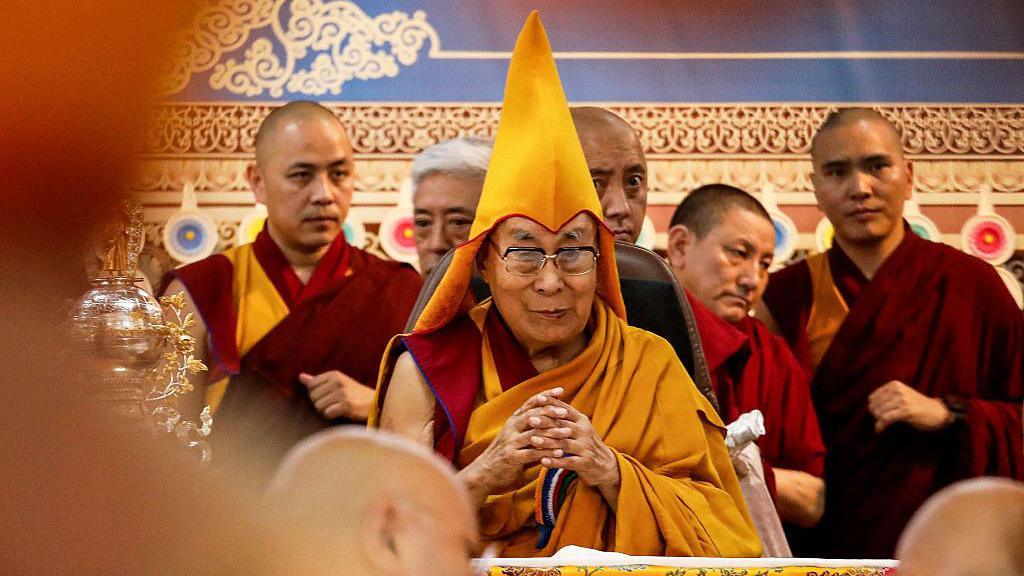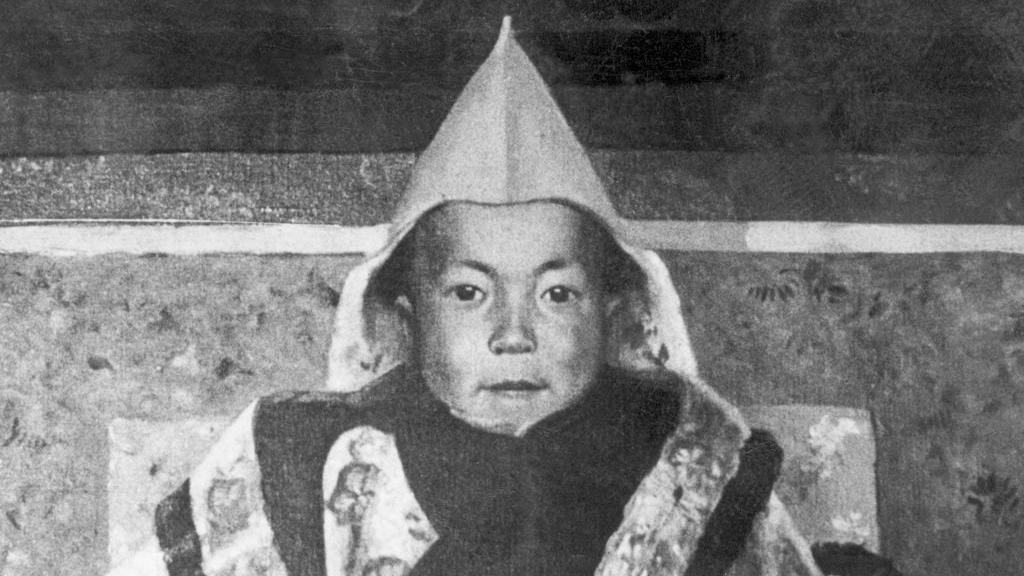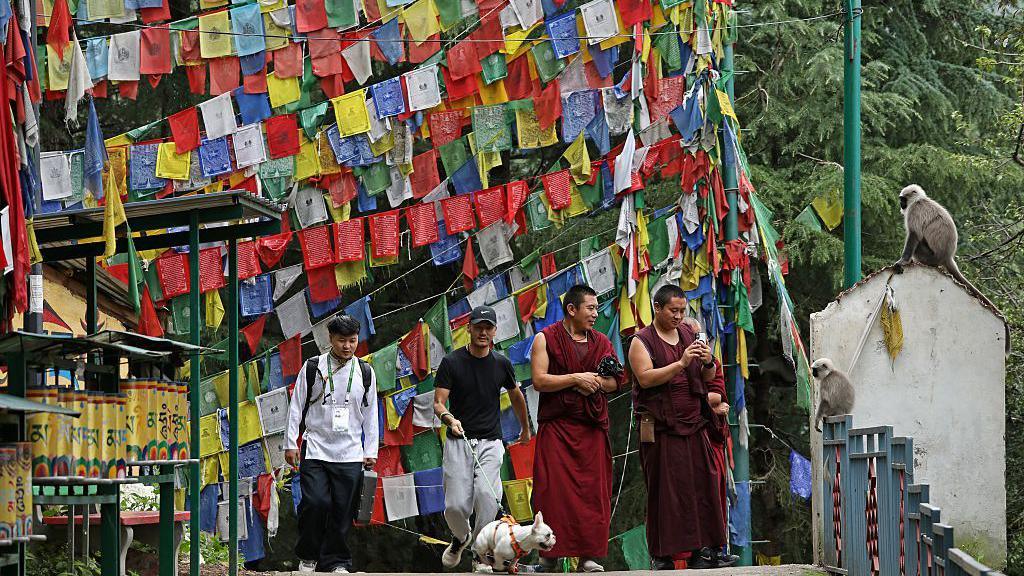Who is the Dalai Lama and why does he live in exile?

As the Dalai Lama turns 90, he has confirmed that he will have a successor when he dies
- Published
In March 1959, as Chinese troops crushed an attempted uprising in Tibet, Tenzin Gyatso, the 14th Dalai Lama, fled into India.
Then a young man in his early 20s, the future must have seemed bleak.
With few countries prepared to respond to China's actions, he faced a difficult task to protect Tibetans and their traditions.
Yet despite decades in exile, his reach has extended far beyond his community. He is not just the Tibetans' spiritual leader and a living symbol of their hopes of reclaiming their homeland, but also a global peace icon and one of the world's leading religious figures.
He was awarded the Nobel Peace Prize in 1989 for his consistent opposition to the use of violence in his quest for Tibetan self-rule.
Beijing continues to view him as a dangerous separatist, though he has said his goal is for Tibetan autonomy rather than independence.
Now, after a lifetime spent at the centre of China's fraught relationship with Tibet, the Dalai Lama is focusing on the future.
As he turned 90 in June 2025, he confirmed that there would be a successor after he dies, putting to rest doubts about the continuation of his 600-year-old Buddhist institution.
Child leader
The 14th Dalai Lama was born on 6 July 1935, in a small village just outside the current boundaries of Tibet.
His parents, who named him Lhamo Dhondub, were farmers with several other children.
When he was two years old, a search party of Buddhist officials recognised him as the reincarnation of the 13 previous Dalai Lamas and he was enthroned before he turned four. He was given the monastic name Tenzin Gyatso.
He was educated at a monastery and went on to achieve the Geshe Lharampa Degree, a doctorate of Buddhist philosophy.
But in 1950, when he was 15, troops of China's newly-installed Communist government marched into Tibet.
As soldiers poured in, the Dalai Lama assumed full power as head of state.
In May 1951, China drew up a 17-point agreement legitimising Tibet's incorporation into China.
Then, on 10 March 1959, a Chinese general invited the Dalai Lama to attend a performance by a Chinese dance troupe. But Tibetans feared it was a trap aimed at abducting the Dalai Lama, and many began gathering by his palace to protect him.
This evolved into protests against the Chinese troops' presence in Tibetan territory. The People's Liberation Army launched a brutal crackdown, and thousands are said to have died.
Days later, the Dalai Lama fled the palace, a decision he said was based on divine orders from his personal oracle. He disguised himself as a soldier and slipped into the crowd one night.
Together with an entourage, he arrived at the Indian border after a gruelling 15-day trek across the Himalayas.
The Indian government granted asylum, and he eventually settled in Dharamshala in the north of India, which became home to the Tibetan government-in-exile.
The Dalai Lama was followed into exile by about 80,000 Tibetans, most of whom settled in the same area.

When Lhamo Dhonduba was two, Buddhist officials recognised him as the reincarnation of the 13 previous Dalai Lamas
'Middle way'
In exile, the Dalai Lama began the task of trying to preserve the culture of the Tibetan people and publicise their plight on the world stage.
He appealed to the United Nations and persuaded the General Assembly to adopt resolutions in 1959, 1961 and 1965 calling for the protection of the Tibetan people.
The Dalai Lama has advocated a "middle way" to resolve the status of Tibet - genuine self-rule for Tibet within China.
In 1987, amid protests in Lhasa against the large-scale relocation of Han Chinese into Tibet, the Dalai Lama proposed a five-point plan, in which he called for the establishment of Tibet as a zone of peace.
He never wavered from his stance of peaceful resistance and in 1989 was awarded the Nobel Peace Prize.
The committee praised his policy of non-violence, which it called "all the more remarkable when it is considered in relation to the sufferings inflicted on the Tibetan people".
Over the decades he has met many political and religious leaders around the world. He visited the late Pope John Paul II on several occasions and co-authored a book with Archbishop Desmond Tutu. Along the way he attracted support from Hollywood celebrities such as Richard Gere, Martin Scorsese and Lady Gaga.
But the non-violent philosophy that won the Dalai Lama recognition from the international community has been a source of frustration for some Tibetans who believe he has been too soft on Beijing.
In 2008 deadly riots broke out in Lhasa and elsewhere in Tibet over the Chinese government's treatment of Tibetans. Beijing said around 20 people were killed in clashes with police, though rights groups estimate the actual death toll was far higher.
The Dalai Lama has also at times been the subject of international controversy, most notably in 2023 when a video showed him telling a child to suck his tongue. His office said the spiritual leader often teased people in a "playful way", and the Dalai Lama apologised for the incident.
His office also apologised in 2019 after he told the BBC that any future female Dalai Lama should be "attractive".

When the Dalai Lama fled to Dharamsala in 1959, thousands of Tibetans did the same
The succession question
Historically, the Dalai Lama acts as both the political and spiritual leader of Tibetans. But in March 2011, the current Dalai Lama relinquished his political authority to a democratically-elected government-in-exile.
In recent years, as he's got older and faced minor health issues, there have been growing concerns about the issue of succession - and, by extension, the cause of exiled Tibetans of reclaiming their homeland.
These worries grew when the Dalai Lama suggested there might not be a reincarnated successor, and that it was up to the Tibetan people to decide.
But when he turned 90, he settled the question once and for all.
In a statement he said that after receiving many requests and feedback, "the institution of the Dalai Lama will continue".
Some experts have interpreted his words as a signal to Beijing that his legitimacy is based on consent, in contrast to China's annexation of Tibetan territory.
He also said that only his office had the authority to recognise the future reincarnation and that "no-one else has any such authority to interfere in this matter", a clear rebuke to China that has insisted that it alone has a say on the matter of succession.
Beijing responded by reiterating that the Dalai Lama's successor will have to be approved by them.
The Dalai Lama has said previously that his successor would be born in the "free world" outside China.
Who that person will be, however, remains unknown.